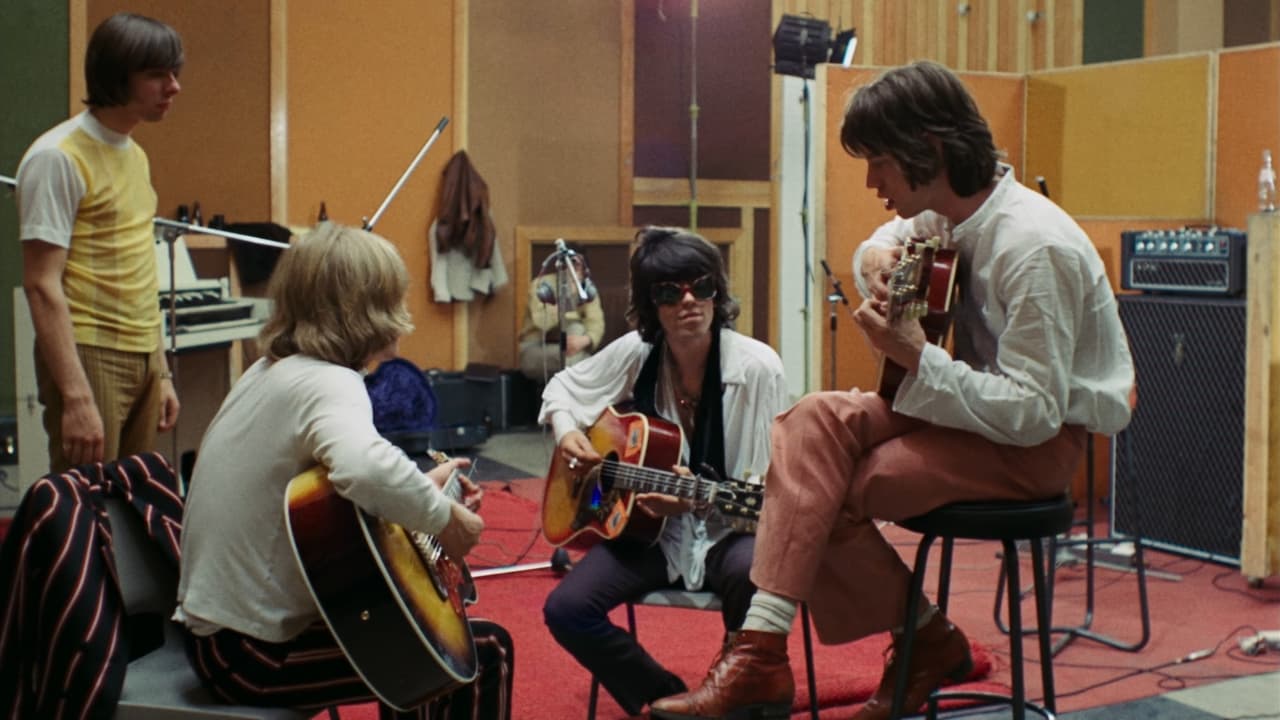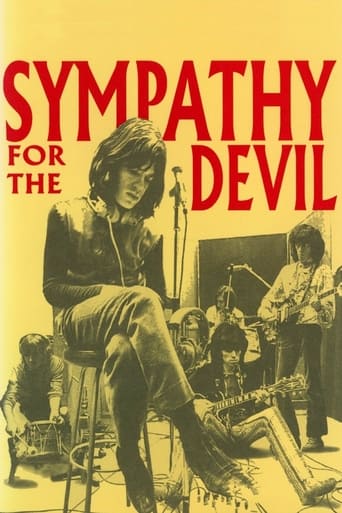

What a waste of my time!!!
... View MoreMost undeservingly overhyped movie of all time??
... View MoreBest movie ever!
... View MoreIt's a feast for the eyes. But what really makes this dramedy work is the acting.
... View MoreHere's the ridiculous problem with this sad little orphan of Godard's oeuvre: Jean-Luc at first seems to be havin' his way with us, mocking anyone for taking any of their own "political" ranting too seriously, which is fine - I can relate to that. But what does this attitude say about the apparent earnestness of the Stones' as they labor to create that outrageously excellent song? I think those moments of the Bad Boys of Rock n Roll working together like inspired scientists is the real deal, the genuine article. They aren't pretending to be creating, they aren't pantomiming for the camera, they aren't subverting their own creative process. They are just doing it. Very little false reality, it seems, going on during those gripping scenes of the band engaged in something wonderful - as tragic as it is to see Brian Jones deteriorating. So why would Godard keep interrupting these sublime moments? Why does he disrupt this "sacred" ritual with his own "profane" parody? Or, is it that in celebrating radical revolutionary thought and activity - by way of his self conscious cinematic method - he is expressing kinship with the spirit of the Stones? Could be, but he can't have it both ways. Anyone familiar with Godard, however, is aware of his well stated revolutionary beliefs, so, ultimately there's little doubt as to what position he endorses, so why this ambiguity, these contradictory signals? This ambiguity only undermines whatever position he might be endorsing. His "philosophy", in this instance, is intrusive and self diminishing, as opposed to the expansive revelatory magic of the Stone's performance. In short, he's confused and this "film" is a mess. A classic case of the Radical Philosopher shooting himself in the foot (or ass, or head). Ah, the perils of a revolutionary.Thanks to digital technology now we can all be creative film editors. With astounding ease I could re-cut this unfortunate disaster and make it a brief but thrilling peak into the Stone's Laboratory as they assemble one of rock's all time amazing monsters. And what to do with all the mock radical philosophical rantings? Off with its head! I give the Stones portion 10 out of 10, and the rest 0 out of 10.
... View MoreIn the late 60s, rebellion against establishment was the order of the day. Paris saw students rioting. They eventually help to bring down the conservative values of De Gaulle's government. Around the world, youth protests against the war in Vietnam. In cinema, Godard and the French New Wave seek new ways of expression. New freedoms from the conventional shackles.At this movie's London opening, Godard was incensed at his producer's unauthorised changes. Godard suggests the audience ask for their money back. Donate it to Cleaver's defense fund, he says. (Black Panther Eldridge Cleaver had just gone underground.) The London audience dissents. Godard calls them fascists. A melee ensues. Godard punches the offending producer who, ironically enough, played a fascist porno bookseller in the film.Sympathy for the Devil is experimental cinema and agitprop at its finest or most incomprehensible. The main thread is a documentary of the Rolling Stones as they create and record the eponymous song. Then, without warning, the camera will cut back and forth to abstract, fictional scenarios. Quasi-documentary style diatribes. Godard in full-flow polemic.Much of Sympathy for the Devil can appear chaotic to casual audiences. The answer is maybe to let it wash over you. The montage, the barrage of ideas, will evoke responses from a diligent and intelligent viewer. But what you make of it may have a lot to do with your own psychological make-up.Apart from the Rolling Stones, the other main sequences are these: A scrapyard. Black revolutionaries. White women wearing only simple white smocks. At one point, the 'Panthers' lay their guns on the women's prone bodies, angled, as if about to fire from a trench.A rural scene. A woman called Eve Democracy gives yes/no answers to a filmmaker's reflections on revolution and the role of culture. Statements are offered as questions. "There is only one way to be an intellectual revolutionary and that is to give up being an intellectual." "Orgasm is the only moment when you can't cheat life." "The tragic irony is that in fighting communism we are creating the absolute equivalent of communism in our own society." A seedy bookshop. A man reads from Mein Kampf. The scene explores fascism, imperialism, art and exploitation.A graffiti artist sprays compound neologisms / word-games on cars and billboards. 'Cinema' becomes 'Cinemarxism.' A man is interviewed on black power and Marxism by two young black girls. Fighter planes are heard overhead.Godard uses right and left wing propaganda for dialogue. Many detractors have lost interest over this, accusing him of failing to make coherent arguments. But to my mind, the outpourings of revolution, like the testosterone charge of youth, are never fully formed. They combine brute force with an intellectual striving. For good or ill, they invoke change. Another intercut soundtrack has a prim Englishman reading from a pornographic text.The film's intertitles use different highlighted letters for tangential meanings. For instance, one section is called 'Outside Black Novel'. Four of the red letters are highlighted with black paint to make the word 'love'. We see a black man sitting in a wheelbarrow. He's on a jetty next to scrap cars and reads out loud from a book (probably by Eldridge Cleaver). He speaks of the blues of the black man, leading us into the idea of how their music was exploited by white men. The camera pans into the junkyard (a metaphorical human or technological scrap heap). Black revolutionaries arm themselves and make speeches. The white women prisoners arrive in a red mini van.The creative process, minutely observed in the recording studio, parallels themes of revolutionary spirit and sexuality. In a dramatic scene, Eve Democracy falls. Her body is borne sacrificially aloft, caught between the red/black flags of communist and anarchist. It recalls a striking image of guns laid over the prostrate and scantily clad bodies of two white women. The guns angled as if firing over a trench.To Godard, the dilemmas of the film were open-ended. Providing a 'conclusion' would have been against the sense of primal revolution that was the film's core. Which is why he was so incensed that, for commercial reasons, the 'completed' song had been tacked on the end.Godard's first English movie was originally to be about abortion, but the new abortion law in England spoilt his plans. He then visualised a dialectic between creation (the recording of a song) and destruction (the political climate that leads to uprisings). He would intercut the recording session with a triangular love story about a white revolutionary seduced by a Nazi Texan. She becomes suicidal when her real lover embraces the black separatist movement. But Godard decided on the more abstract formula. Still, such traces of the original story provide insights to Sympathy for the Devil. Godard's title (his 'Director's Cut') was One + One which he pointed out didn't necessarily mean two.Although not really a film for any but the most dedicated of Stones fans, it provides intimate insights into their workings as a band. We see Jagger's sober and patient leadership. Brian Jones fairly off his face. The dogged persistence of the band until a good version is achieved. (The film is in not critical of the Stones, in spite of the minor 'theft of black music' theme.) They are here enshrined with one of the most creative filmmakers of the generation. It has an honesty and depth conspicuously absent from the same song performed forty years later in Scorsese's glossy concert operation, Shine a Light. The guilelessness here would then be gone. The 'meaning' of the song, appropriated so beautifully by Godard, probably lost in bright lights and presidential approval.Sympathy for the Devil is overtly political and not the easiest of Godard's films. But as a shock to a cinema grown fat on saccharined sweetness, it is a breath of intellectual fresh air. I watched it twice straight through.
... View MoreCaught this the other day and thought it was amazing. I loved the the way there two stories. Firstly being the stones writing sympathy for the devil, which was a revelation to watch. Throughout the film the style of the song changes, transforms mutating into what we know. That in its self was compelling.The second story follows different characters as they explore different debates on race, gender and media. What stuck me with it was the way it captured the period. A lot of the film's style and attitude is very sixties. Just look at the cars in the wrecking lot, everyone a vision of 50's colours arranged in a crazed mass on the banks of the Thames. It's hard to visualise a world like that now.This film is well worth a watch.
... View MoreRocky Dijon plays congas. Also engineer Andy Johns is seen and my father, producer Jimmy Miller can be seen through the studio window and heard talking to Mick. The band was working at Olympic studios in London. I spent my childhood in England and many weekends and holidays at Olympic Studios while my father recorded the Stones and Traffic. I made tea or brought soda for everyone while they worked. I sometimes sat on the drums and played around. Charlie said he would give me his kit from his home and I am still waiting for the drums to arrive. The memories will last forever. Now if there was a way to return to the 1960s I would in a heart beat. Steve Miller
... View More